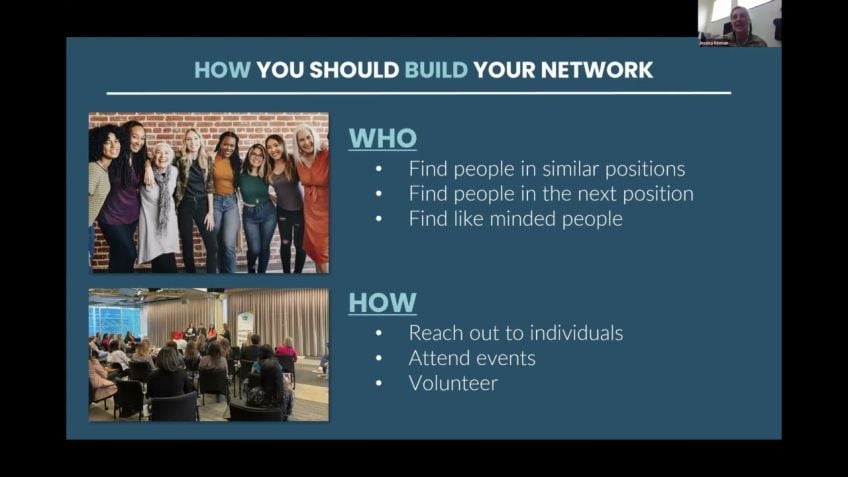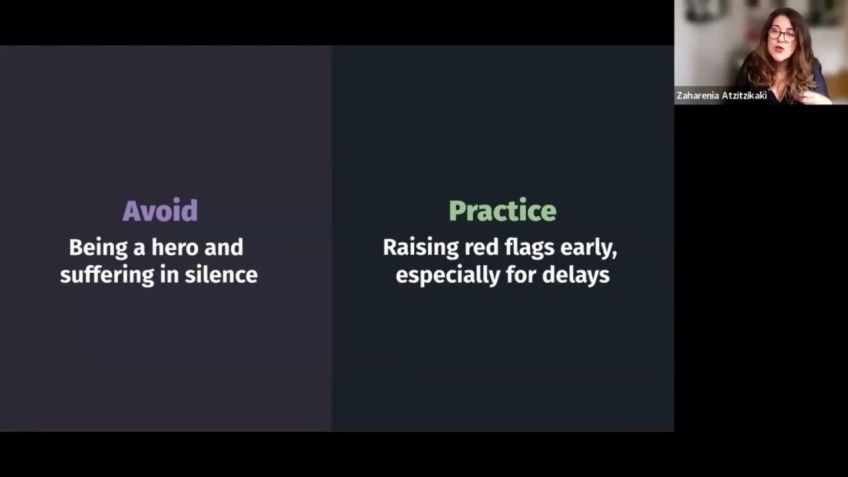Ann Francke at WomenTech Global Awards 2020
Anne Frank: An Advocate for Gender Balance in the Workspace
Meet Anne Frank, the Chief Executive of the Chartered Management Institute. Anne's eminent leadership in business and management has taken her through top-flight corporations such as Proctor & Gamble, Mars, Boots, Yelp, and BSI. But what sets her apart is her specialization in gender balance in the workplace, a topic she regularly addresses through media outlets and conferences.
Anne's Both a Leader and An Author
Beyond executing roles in the business arena, Anne is also an author. In September 2019, she published her insightful book, "Gender Balance: Creating a Gender-Balanced Workplace." She also contributed to the "Financial Times Guide to Management". Anne's relentless passion towards establishing equality in workspaces earned her a spot in the top 100 women to watch in the 2015 FTS A Granell Report. This goes hand-in-hand with the Macom Award for outstanding leadership of a UK professional body and, most impressively, an Order of British Empire Award for workplace equality services.
The Chartered Management Institute and Crisis Management
As the Chartered Management Institute's CEO, Anne plays a crucial role in managing crises in the professional world. Under her guidance, the institution has garnered notable achievements, including being in the Top 3% of I IP platinum certified organizations and selection for The Times' Top 100 Companies to work for.
Creating Consciously Driven Leaders
At the Chartered Management Institute, there is a commitment to transform accidental managers into conscious leaders. The institute's vision is to foster a professional environment that centers on leadership and management. Additionally, the institute seeks to amplify employees' capabilities even during challenging times like a pandemic.
Keys to Effective Crisis Management
Through research and study, Anne and her team have delved into valuable tips on navigating crises effectively. The fundamental principle - employees' management and leadership significantly impact their productivity more than their location of work. Other tips include mastering communication, prioritizing employees, cultivating a healthy work culture, and investing in diversity and inclusion.
Communication and Trust: The Backbones of Productivity
Believing in employees' capacities boosts their productivity. Therefore, it is vital for employers to assign each team member's responsibilities with trust and clear expectations.
Clear and Honest Communication
In a crisis, honesty and clear communication are vital characteristics. Keeping an open line of communication with employees under challenging circumstances not only promotes trust but also enhances well-being within the team.
Maintaining staff well-being, especially in a crisis, involves looking after their physical and mental health. Offering support and making work provisions also builds resilience in the workforce during difficult times.
Creating a Positive Work Culture
It's possible to nurture a great remote culture through shared updates, enabling flexible working, and using technology effectively. Growing a positive culture influences productivity, and organizations should commit to nurturing this in their work environment.
Championing Diversity and Inclusion
During these challenging times, advocating for diversity and inclusion is incredibly crucial. From supporting women to diverse ethnic minorities, young people’s unique needs should be addressed. This responsibility rests on every stakeholder's shoulder to make workplaces conducive for all.
Want to learn more about Anne Frank and her work? Visit the Chartered Management Institute’s website for additional resources. Amidst challenges, let's remember to build trust, communicate effectively, promote physical and mental health, advance a solid culture, and champion diversity and inclusion.
Video Transcription
I'm super excited to announce our next speaker. Her name is Anne Frank.She is Chief Executive of Chartered Management Institute and she started her career at Procter Gambler and has held senior executive positions at Mars Boots Yelp B SI and is an expert on gender balance in the workspace and frequently speaks in the media and conferences on this and other management topics.
Her book on Gender Balance Creating a Gender balanced Workplace, published in September 2019 and also authored the Financial Times Guide to Management and has been named in the top 100 women to Watch in the 2015 fe by female FTS A Granell Report. She was also awarded the Macom Award for outstanding leadership of A UK professional body in 2016, as well as an Order of British Empire Award for services to workplace equality.
So, hello, everybody, apologies for that technological glitch. It's always an issue. Um I'm delighted to be here. I'm going to share quickly now cause I realized um we took some time to get here. Um Some research that the Chartered Management Institute did around how to manage in a marathon crisis. And hopefully there'll be some very good tips for all of you. Um So first, just a little about CM I, we are the charitable body, uh professional body for management and leadership.
We uh like to say, we turn accidental managers into conscious leaders. Um We've been around almost 75 years. We are uniquely um enabled to award chartered manager and we have about 100 and 43,000 in our management um and leadership community. Uh So we ourselves practice what we preach.
We're um I IP platinum certified. So that's the top 3% of organizations. And we're also in the, in the times top 100 companies to work for. Um So how do you manage in a new normal? Well, we asked over 2300 managers and leaders and employees and this is what they told us. There are four areas of focus the first and it might surprise you is, it's not where you work. It's the way that you do. That means whether you're in a um restaurant where the demand is falling and you have to close or working virtually in a tech company is not the main uh consideration what matters most is how you are managed and led. The second thing is that mastering communication and prioritizing your employees are absolutely top of the list when it comes to getting the most from people in this crisis. The third is you'd be surprised how important culture uh is to engaging employees and it is possible to create a great remote culture and we'll give you some tips on how to do that. And the final point, which is very important, of course, for women in tech is that it's very vital that we all redouble our commitments to inclusivity. So let's look at some of the data behind those findings.
Obviously, we've seen a huge shift um from uh people working virtually or a blend of uh or hybrid working virtual and on site from 22% to 48% in this crisis. So a big jump in the number of people doing that. Um But actually, you might think, well, since we're all working, virtually, managers are less important, quite the opposite. So actually, managers and leaders are much more important now um than they were pre crisis and that's going to stay the same well into 2021. Now, the key to getting the most out of your team and boosting their productivity is to trust them. And we found significantly higher productivity where managers and leaders trusted their employees to be getting on with it no matter where they were working. And that's a vitally important thing to remember. You do not want to give people the impression that you don't trust them to be getting on with their work when they're working remotely, for example. Um So that's a very, very important point also, um what this means for you is, you should really understand what your objectives are, what your organizations are and what your team objectives are. You should be thinking across teams delegate to empower and motivate people, maintain your personal connections and demonstrate that you are reliable. Those are all very important points. Now, how do you do this? How do you be a good manager and leader in this crisis?
Well, we asked what are the most important characteristics and the top characteristic is clarity of communication. It is so important that you are able to uh be very clear in the advice and guidance that you're giving people. The second most important characteristic was honesty, that trust and honesty is so important in this crisis. And the third most important characteristic was to listen. And if you are going to be able to really find out how your team is doing, you have to ask them, how are you, what are you doing to look after yourself and listen to their answer? That's so important, especially when we can't pick up on the body language so much. Um because so many of us are working remotely. So these characteristics are really the top for maintaining communication and well being. When you are a manager of a team or whether you're a CEO of a company, they're vitally important. What's the role of a manager and a leader in this crisis? Well, our 2300 managers, leaders and employees told us that the number one wish they had was ensuring staff well being. Now, that's a word that's been bandied about a lot, but it really means looking after not just the physical health of your employees but their mental health.
It does mean asking that question I suggested earlier, which is how are you and what are you doing to look after yourself? And then listening to the answer, supporting staff with their work is also incredibly important in this crisis. As is providing leadership for the team, you don't have to be the CEO to be a leader. You are leading those that you manage and they need to hear from you and they need to have clarity of communication and clarity of objectives. These are all incredibly important in this crisis. So what can you do? Well, make sure that you're communicating regularly and an engaging and authentic manner. Remember you're trying to inspire trust. So you have to be engaging and authentic in your approach, tailor your approach.
If you're communicating with somebody who's an interest revert, that's very different than communicating with somebody who's uh you know, very energetic. If you're communicating with somebody who has personal issues, perhaps a loved one is ill or you have to take a different style or perhaps you're um speaking with a young person who's just joined the workplace and is struggling um because they're in a house, share with six others or perhaps living on their own and feeling lonely So there's lots of different um employees that you will be communicating with and team members.
And you also need to encourage them to look after each other and check in regularly. So make sure you do at least have a daily check in with your team and make sure that you have at least 1 to 1 check ins with everybody that you work with at least once a week, if not more. And also it doesn't always have to be by zoom. Just pick up the phone. That's fine. Actually many people prefer it because they get zoomed out. We have what we call a walk and talk where we have an hour every day with no meetings. And if you need to talk to somebody during that time, you just go out for a walk and talk to them on the phone. So things like that are very important and if you are struggling, please do not be afraid to ask for support, please flag that you are, you know, just feeling a little overwhelmed or a little anxious. That's very, very common and make sure if you are managing people that you pick up on the signs, you know, if people are always turning their cameras off, for example, that could be a sign that they're feeling a bit anxious, you might just wanna call them on the phone and again, ask, how are you and what are you doing to look after yourself?
And if you are struggling. Please ask for support. Please do use your employer resources and turn to your line manager and others to look uh to say, you know, I, I need um time off or I'm struggling with my well being, it's absolutely fine and important that you do that. Now, I mentioned that culture is incredibly important and you can create culture remotely or in a hybrid workplace or indeed if you're working on site and it's all about how you behave and the things when we asked people, what are the things that companies are doing to create improvements in their culture?
They cited a number of different behaviors. They said that having shared updates through emails or, or chat or even zooms. We do that at CM I. Every week I have a Friday update. I take questions, people ask them anonymously, we update how everybody's doing and it's a very, you know, we play some games and we have some quizzes. That kind of thing is very important, making sure that you communicate regularly and using technology to do that, enabling and embracing flexible working, respecting that people have Children and pets and animals and parents that they need to look after and giving them the time to do that during the work day is very important when you do these things.
And they're on the left hand side of this chart, you do create a better culture and you do increase productivity. And if you do these things less. That's on the right hand side of the chart, you can see that actually culture gets worse. So it's very important that you do the things that are listed here. So the key actions, culture is important and your views are important. So share them. Um If your company or organization isn't doing some of the good things, remind them of the need to do that, try to provide solutions and ideas, get to know others. Many people have told me they've gotten to know their other colleagues much better in this crisis and make sure you look after yourself, make time for your own personal development. That is so important. My final point is that diversity and inclusion is more important than ever.
Unfortunately, though, when we asked our colleagues, it is their, their importance of it has somewhat dropped since the pandemic. But the biggest um concern for me is that only 7% of white colleagues said that um that DN I was one of their top priorities, but 36% of black colleagues told us that it was very important and black colleagues also were more likely to report that their managers didn't trust them.
The other thing we found is that that working mothers are getting less communication um from their line managers than, than others. And I think it's probably because they're either too busy, also trying to cope with looking after kids. And also because managers um sometimes assume that they don't want to be spoken with because they're struggling to look after the kids. It's really important that you work, reach out to the working mothers in your organization and ask them and allow them to fit their kids into their workday schedule. If they need to take a break to do the school run or help with homework. It's just very important that you let them do that. And of course, Gen Z have been hit, the young people very hard by this crisis. They are worried about their job security and they're often in less um positive circumstances in their work. And so you just do need to be mindful of their needs. Um And everybody misses socializing in the workplace. That's the number one thing they miss. So if you can create informal opportunities to have staff picnics outdoors and things like that, you should certainly look into that.
So the top takeaways build trust, it's critical to driving productivity over communicate. That's the number one ask of people in this crisis, clear, consistent, regular communication, manage people's mental health and make sure you ask, what are you doing to look after yourself today?
Look for the cues that people might be suffering, anxiety and encourage them to speak out and seek help model the right behaviors to create a strong culture, no matter where you are working, you can improve your culture in this crisis. And finally, please don't forget whether it's for women, whether it's for diverse ethnic minorities, whether it's for young people, please be a champion of diversity and inclusion. So, thank you for listening to me. Those are my top tips and I think we started a little late, but if we do have time for questions, happy to take any or um you can always find out more um and get more free resources on our website, which is uh listed here. Thanks for listening. Hi, Anne.
That was really great presentation. I'm happy to work. There are many tips to take and I'm sure people were taking screenshots and taking notes on that. I really love your last point that you said that regardless where you're supporting women, it's important that we make sure that we are diverse and inclusive and in times like this to provide our full support to those in need and it's not too much over communicating. Right.
You could never over communicate. Exactly. Exactly.
Love your point. People at tell an excellent presentation. It was amazing session and thank you very much and you shared some resources where people can find more. Fortunately, we must continue. It was great to have you with us and I'm very happy that you managed to ma manage with hoping. Now we're going to have you more at our events if you have time for us. I know you're super busy. Thank you very much and I'm wishing you a great evening.
Thank you. Thank you.
Bye
bye.





